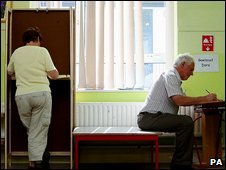|
By Gary O'Donoghue
Political correspondent, BBC News
|


Parties pay attention to their projected national share in local elections
|
Labour has been talking down its prospects in the current English local elections for weeks now. BBC correspondents have predicted on air that the party might just hold on to one of the four county councils it was defending. A spin doctor responded to one such report by telling the corporation "no", they didn't expect to hang on to any councils they were defending. And that was before the departure of ministers Jacqui Smith on Tuesday and Hazel Blears on Wednesday, events which must have felt like a kick in the stomach for all those canvassers trudging their weary way around the streets. It now seems the party's pessimism was well-founded. With the BBC calculating Labour's projected national share at 23%, that puts the party another per cent lower than its historic low from last year. It is important to realise that projected national share is an extrapolation - based on key council wards - but it does give us some indication of how the parties might do nationally and the parties themselves certainly pay attention to it.
 |
 Labour will not be surprised by these results and that may have consequences for any appetite among backbenchers to mount a concerted push against Gordon Brown
Labour will not be surprised by these results and that may have consequences for any appetite among backbenchers to mount a concerted push against Gordon Brown

|
Some diehards will point out that Labour only got 26% in projected share in 2004, just a year before going on to win a general election. But with councils like Staffordshire and Derbyshire now falling to the Tories, the Conservatives can claim to be picking up votes where it counts most. For the Tories a projected national share of 38% sees them down on last year's results by 6% but at the same level as 2004. They would be disappointed not to hit the magic 40% mark but will take comfort from the fact that they are not just hitting Labour hard but also running the Liberal Democrats close in some of their key strongholds in the south west of England. Early reshuffle Taking Bristol is a major plus for the Lib Dems, particularly as the city has three Labour MPs and the party's whole strategy has been aimed at hoovering up in the wake of Labour weakness. But the party will be concerned about the Tory gains in the South West, and will hope that a projected national share of 28% will bolster numbers elsewhere. It is still early, with many results still to be declared and of course we will not get the results of the European poll until Sunday, but Labour will not be surprised by these results and that may have consequences for any appetite among backbenchers to mount a concerted push against Gordon Brown. Mr Brown, of course, had to bring forward his reshuffle today, partly because cabinet ministers like James Purnell keep resigning. Ideally he would have wanted to wait until Monday to do it, once all the results were in. What is striking as the final cabinet line-up becomes clear is how few new faces there are. No radical shake-up In many ways the prime minister had his hands tied. The chancellor would not move, the foreign secretary wanted to stay put and others would have felt able to name their job. But the return of Peter Hain and the promotion of Bob Ainsworth can hardly be described as a radical shake-up in personnel. Putting Alan Johnson into the Home Office is an understandable move. The man most tipped to succeed the prime minister could hardly have refused one of the great offices of state. It also serves as yet another brake on the would-be conspirators, as their favoured son spends a good deal of time saying how he does not want the job and could not do it any better than Gordon Brown. For now the plotters have been slightly silenced and will wait for the European results on Sunday. If Labour were to come fourth or fall below 20%, then they may find themselves a little more momentum.
|


Bookmark with:
What are these?